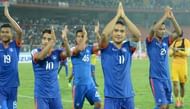India’s capital city of New Delhi isn’t exactly renowned for being football-crazy. Indian Super League side Delhi Dynamos have often played in front of minimal fan support, so it was heartening to see the people of New Delhi turn out in big numbers for the FIFA U17 World Cup games.
India’s maiden FIFA U17 World Cup campaign came to an end after their 4-0 loss to Ghana, but there were enough moments in the tournament to make the nation’s football fans proud. The FIFA U-17 World Cup 2017 will forever go down in history as the year India finally made their debut in a FIFA tournament, we feel that football is getting a new avatar all around, but are we their yet.
Indian senior team qualified for the AFC Asian Cup 2019 in grand fashion and India is lucky to have Sunil Chhetri, not just because he is a world-class forward, but also because he's such a pragmatic and intelligent leader, but do the other players live up to his standards?
Indian football team went from 171 to 97 in FIFA rankings this year which was a great achievement for the team, but to compete with the Asian giants we need to step up. For that, we need players with good technical ability. As we all know the technical side of Indian players are not up to the mark for that we need players who were trained in world-class facilities from a young age and approaches football in a professional manner. This takes us to Indian-origin foreign-based players.

To get a respectable position in Asia as a footballing nation we need skilled and technically sound players. With just one Chhetri, India would not be able to compete with the Asian giants in 2019. To change that, India should apply the Guus Hiddink formula when the Dutchman was the coach of Australian football team (Socceroos), he was instrumental in the change of Australian football.
A decade after ending 32 years of hurt to pilot Australia to the 2006 FIFA World Cup in Germany, Hiddink admitted that subterfuge played a part in the Socceroos' momentous qualification win over Uruguay.
For team building what Hiddink planned out was a simple solution, much like their current Indian counterparts the Australian native players where not technically sound that was because of lack of grassroots training facilities in Australia. So he introduced 'Australian-origin foreign players' to the national side and the effects were staggering.
The Socceroos reached the Round of 16 in the 2006 FIFA World Cup. Australia has less visa related issues than India, India doesn't allow dual citizenship that is the main problem faced by Indian-origin foreign players.

An interesting point raised by India head coach Stephen Constantine, according to an All India Football Federation (AIFF) official, was regarding the ineligibility of Indian-origin players residing outside of India to represent the country.
It would seem natural, therefore, for the All India Football Federation (AIFF) to turn to non-resident, Indian-origin footballers in an attempt to raise the profile of Indian football. This is possible under Article 6 of the FIFA Statutes, which lays down the following three circumstances under which a player born in any given country may still represent his country of origin:
#1 His biological mother or father was born in the country.
#2 His grandmother or grandfather was born in that country.
#3 He has lived continuously in that country for at least two years.
What, then, is stopping these players from representing India?
The answer is the Indian government.
On 26th December 2008, the Ministry of Sports issued a notification barring non-citizens from representing India in any sport. The significance of this ruling with regard to football is that these persons, who may qualify for selection under FIFA Law (which says nothing about citizenship), remain ineligible under Indian Law (which requires that they obtain an Indian passport).
FIFA’s Laws and the Indian Government’s stance on the matter differ fundamentally. Article 6 (stated earlier) reflects the principle of dual nationality, a concept that is not recognized by the Constitution of India. Further complicating the situation is the fact that the Sports Ministry’s position places the AIFF in direct violation of FIFA’s rules, the consequences of which may prove to be drastic.
In simple words "you should be an Indian citizen to play for India".
In India, we could have players like Danny Batth (Wolverhampton Wanderers) defender who has shown interest in playing for India. There are other talented players of Indian origin like Neil Taylor (Aston Villa), Harmeet Singh (nicknamed the Norwegian Iniesta), Luciano Narsingh and his brother Furdjel Narsingh. If talented and technically sound players like the players mentioned above start playing for the Indian team, the Blue Tigers would be a strong force to reckon with in Asia.

Rumour has it Batth, whose father hails from the north Indian state of Punjab and is one of just a handful of British players of South Asian descent playing professionally in England, was willing to lose his British citizenship to play for India. Batth also held talks with India coach Constantine in June. Just imagine if a player of his standard plays for India. The defence line would have much more stability.
It is said that stronger the midfield, stronger the team. Constantine would die for a midfield playmaker for the Indian team now and the perfect solution would be Harmeet Singh. Hailing from a Punjabi family in India, Harmeet is as inclined towards his Indian connections as he is to his football engagements on Norwegian soil. Harmeet was introduced to the world of football by his native club, five-time national champion Valerenga FC. However, he shot into limelight soon and years later in 2010, he was showered with praise by Pep Guardiola after a game against Barcelona that saw him scoring an impressive goal for the Norwegian side. So much so, the media even titled him as the ‘Norwegian Iniesta'.
There are other prodigies like Yan Dhanda and Joshua Pynadath who are considered to be the next big things.
So there is no shortage of Indian origin talent abroad but its just a matter of change in the citizenship laws.
The time has come to change this outdated law and allow Indian football to flourish to the next level.
I hope that the future of Indian football would be bright and for this upcoming 2019 Asian Cup, there would be Batth as a defender, Harmeet as a midfielder, Narsingh as a winger and Chhetri as a striker, a combination that would be nothing less than magical.
